
Here’s a recording in a mystery language.
Can you identify the language, and do you know where it’s spoken?

Here’s a recording in a mystery language.
Can you identify the language, and do you know where it’s spoken?

I discovered today that in Romanian a bookworm (a keen reader) is un şoarece de bibliotecă (a library mouse), which I rather like, being a bit of a bookworm / library mouse myself.
In French there is a simliar term for a bookworm – rat de bibliothèque (library rat), and in German voracious reader or bookworm is known as a Leseratte (reading rat), and in Spanish the equivalent is ratón de biblioteca (library mouse).
Are there interesting words for bookworm in other languages?
On an episode of Word of Mouth I listened today, they discuss the associations we have with different fonts.
Studies have found that different fonts can effect the way food tastes to you. For example, the same chocolate can taste sweeter, or less sweet, just because it’s labelled with different fonts.
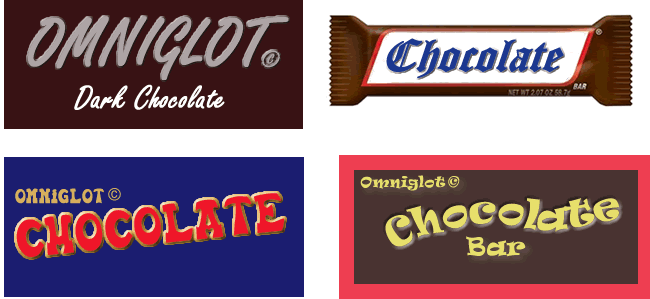
Which of the above would you prefer?
And no, I’m not planning to bring out an Omniglot chocolate bar, in case you’re wondering.
If Greek yoghurt, hummus or other Greek foods are labelled with a Greek-looking font, you may believe that they come from Greece and are more authentic than such products labelled with a different style of font.
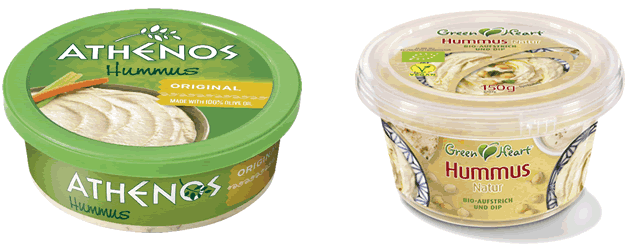
Which of these is most Greek?
Some fonts are seen as more masculine, while others are seen as more feminine.
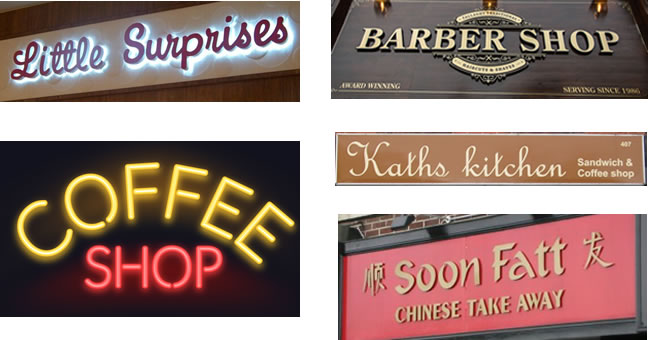
Would you say these shop signs are masculine, feminine or neither?
What are your favourite fonts?
Are there fonts your really don’t like and/or don’t use?

Here’s a recording in a mystery language.
Can you identify the language, and do you know where it’s spoken?
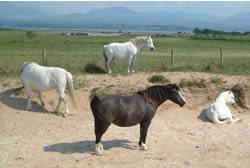
Today I saw a post on Facebook asking why words for horse are so different in languages like English and German, so I thought I’d investigate.
In English horse-related words include horse, stallion (male horse), mare (female horse), foal (young horse), filly (young female horse), colt (young male horse), pony (a small breed of horse), palfrey (a small horse with a smooth, ambling gait) and equine (a horse or horse-like animal; related to horses).
Horse comes from the Middle English horse / hors, from the Old English hors (horse), from the Proto-Germanic *hrussą (horse), from the Proto-Indo-European *ḱr̥sos (horse), from Proto-Indo-European *ḱers- (to run) [source]. This is also the root of the Proto-Celtic word *karros (wagon), from which we get the Latin currus (chariot, wagon), and the English words car, cart and chariot, and related words in other languages.
Stallion comes from the Middle English stalion, from the Middle French estalon and is of Germanic origin [source].
Mare comes from the Middle English mare / mere, from the Old English mere / miere (female horse, mare), from the Proto-Germanic *marhijō (female horse) [source].
Foal comes from the Middle English fole, from the Old English fola, from the Proto-Germanic *fulô, from the Proto-Indo-European *pōlH- (animal young) [source]
Filly comes from the Old Norse fylja [source].
Colt comes from the Old English colt (young donkey, young camel), from the Proto-Germanic *kultaz (plump; stump; thick shape, bulb), from the Proto-Indo-European *gelt- (something round, pregnant belly, child in the womb), from *gel- (to ball up, amass) [source].
Pony comes from the Scots powny, from the Middle French poulenet (little foal), from the Late Latin pullanus (young of an animal), from pullus (foal) [source].
Palfrey comes from the Anglo-Norman palefrei (steed), from the Old French palefroi, from the Late Latin paraverēdus (post horse, spare horse) [source].
Equine comes from the Latin equīnus (of or pertaining to horses), from equus (horse) [source].
The equivalent words in other European languages include:
Germanic languages
| German | Dutch | Danish | Norwegian | Swedish | Icelandic | |
|---|---|---|---|---|---|---|
| horse | Pferd | Paard | hest | hest | häst | hestur |
| stallion | Hengst | hengst | hingst | hingst | hingst | graðhestur |
| mare | Stute | merrie | hoppe | hoppe | sto märr |
hryssa |
| foal | Fohlen | veulen | føl | føll fole |
föl | folald |
The German word Pferd and the Dutch paard come from the Middle High German phert / pherit / pferift (riding horse), from the Old High German pherit / pfarifrit / parafred, from the Late Latin paraverēdus (substitute post horse) [source], from para-, from the Ancient Greek παρά (from, by, near) & verēdus (a fast or light breed of horse), from the Proto-Celtic *uɸorēdos (horse) [source], *uɸo- (under) & *rēdo- (to ride; riding, chariot), from the Proto-Indo-European *(H)reydʰ- (to ride) [source].
The words hengst and hingst come from the Proto-Indo-European *ḱanḱest- / *kankest- (horse), which is also the root of the Welsh, Cornish and Breton words for mare, and of the Old English word for horse or stallion, hengest.
Romance / Italic languages
| French | Italian | Romanian | Spanish | Portuguese | Latin | |
|---|---|---|---|---|---|---|
| horse | cheval | cavallo | cal | caballo | cavalo | equus |
| stallion | étalon | stalone | armăsar | padrillo | garanhão | celo |
| mare | jument | giumenta cavalla |
iapă | yegua | égua | equa |
| foal | poulain | puldero | mânz | potro | potro | equuleus equulus pullus vitulus |
In Latin there was another word for horse – caballus, which was only used in poetry in Classical Latin, and was the normal word for horse in Late and Vulgar Latin. It possibly comes from the Gaulish caballos [source]. This is also the root of the English words cavalry, cavalier, cavalcade and chivalry,
The word equus comes from the Proto-Italic *ekwos, from the Proto-Indo-European *h₁éḱwos (horse) [source].
Celtic languages
| Breton | Cornish | Welsh | Irish | Manx | Scottish Gaelic | |
|---|---|---|---|---|---|---|
| horse | marc’h | margh | ceffyl | capall | cabbyl | each |
| stallion | marc’h | margh | march stalwyn |
stail | collagh grihder |
greadhair |
| mare | kazeg | kasek | caseg | láir | laair | làir |
| foal | ebeul | ebel | ebol | searrach | sharragh | searrach |
The Scottish Gaelic word for horse, each, comes from the
Old Irish ech (horse), from Proto-Celtic *ekʷos (horse), from the Proto-Indo-European *h₁éḱwos (horse), which is also the root of the Breton, Cornish and Welsh words for foal.
The Breton marc’h (horse), the Cornish margh (horse) and the Welsh march (stallion) come from the Proto-Brythonic *marx (horse), from Proto-Celtic *markos (horse), from the Proto-Indo-European *márkos (horse). [source]. This is also the root of the Irish marcaigh (to ride), the Scottish Gaelic marcaich (to ride), and the Manx markiagh (to ride).
You can find more about Celtic words for horse on my Celtiadur blog
Slavic languages
| Bulgarian | Czech | Polish | Russian | Serbian | Slovak | |
|---|---|---|---|---|---|---|
| horse | кон | kůň | kón konno |
лошадь | коњ | kôň |
| stallion | жребец | hřebec | ogier rumak |
конь жеребец |
жребец | žrebec |
| mare | кобила | klisna | klacz kobyła |
кобыла | кобила | kobyla |
| foal | жребец | hříbě | źrebak | жеребёнок | фоал | žriebä |
The Russian word for horse, лошадь, is a borrowing from a Turkic language, probably Tatar [source].
The other Slavic words for horse come from the Proto-Slavic konjь (horse), of unceratin origin [source].
Other European languages
| Latvian | Lithuanian | Albanian | Greek | |
|---|---|---|---|---|
| horse | zirgs | arklys | kalë | άλογο ίππος |
| stallion | ērze | erelis | hamshor | επιβήτορα |
| mare | ķēve | kumelė | merak | φοράδα |
| foal | kumeļi | kumeliukas | pjellë | πουλάρι |
Sources: Reverso, Linguee, bab.la, Google Translate
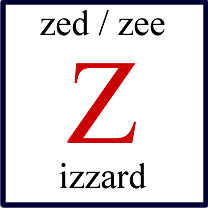
The letter Z is known as zed [zɛd] in the UK, Canada, India, Ireland, New Zealand, and Australia, and as zee [ziː] in American English.
The name zed comes from the Greek name for the letter Ζ ζ zeta (ζήτα). The name zee is comes from an English dialectal form of the 17th century, and rhymes with other letter names, like bee, cee, dee, etc.
Another dialectal name for this letter from the 18th century is izzard [ˈɪzərd], which possibly comes from the Occitan izèda or the French ézed.
The letter Z has had a number of different forms in different alphabets:

It’s origins can be traced back to an Egyptian Hieroglyph which looked like the Proto-Sinaitic version, which meant sword or weapon.
Names for the letter Z in other languages include:
Sources: Wikipedia and Wiktionary
What do you call this letter?
An eponym is a word that derives from, or that is believed to derive from, the name of a real or ficticious person.
Eponym comes from the Ancient Greek ἐπώνυμος (epṓnumos), from ἐπί (epí, – upon) & ὄνυμα (ónuma – name).
Examples of eponyms include:
Many more examples of eponyms.
If your name was to become an eponym, what would you like to be remembered for? And what form would you like it to take?

Here’s a recording in a mystery language.
Can you identify the language, and do you know where it’s spoken?
One of the things that we discussed at the French conversation group last night was how to translate the term handyman into French.
According to Wikipedia, a handyman, or handyperson or handyworker is:
a person skilled at a wide range of repairs, typically around the home. These tasks include trade skills, repair work, maintenance work, are both interior and exterior, and are sometimes described as “side work”, “odd jobs” or “fix-up tasks”. Specifically, these jobs could be light plumbing jobs such as fixing a leaky toilet or light electric jobs such as changing a light fixture.
The term may apply to someone who makes a living doing such work, or to do-it-yourselfers.
The French equivalent on Wikipedia is homme à tout faire (“man who does everything”).
In the Reverso Dictionary a handyman is translated into French as a bricoleur or homme à tout faire. The former is labelled as a do-it-yourselfer, and the latter as a servant. So it seems the connotations of these words are not quite the same as in English.
Perhaps a better translation of homme à tout faire is factotum, which is Latin for “do everything”, and is an old word for a person having many diverse activities or responsibilities, or a general servant.
When you hear the word handyman, what does it mean to you?
What equivalents are there in other languages?
There is an interesting dicussion on the Silly Linguistics Community Facebook page which started with this post:
While learning a foreign language, the teachers sometimes remark that “even native speakers get this wrong. Don’t imitate them”.
How could native speakers possibly be wrong?? If they’re not the standard, then what is?? An artificial one from the textbook?? We learn a language to communicate with the natives, not with the textbook, right??
The debate looks at these questions from different perspectives. Many commenters agree that native speakers do make mistakes in their own languages, and give examples from a variety of languages. Others argue that native speakers of a language don’t all speak the same version of their language. There are also comments about native speakers not knowing the grammar of their own language, or at least not being able to explain why words are used in particular ways.
When field linguists document previously undocumented languages, they work out how the language is used by the people who speak it. They don’t learn the language, then start telling native speakers that they are making mistakes. However, with languages that have standardised versions, especially written versions, people come to believe that the standard version is the ‘right’ version, and any deviation from it is a ‘mistake’. Thus non-standard varieties may be looked down on, ridiculed, and even erradicated by teachers in schools.
Can a native speaker make mistakes in their own language?
Yes. There are various kinds of mistakes a native speaker might make. Such as disfluencies, when you mispronounce words, or get your syllables or words jumbled up. Or you may spoonerise, as in par cark, rather than car park.
You may confuse words with similar sounds or meanings, such as effect and affect. You may miss out words – I certainly do when writing sometimes, and don’t always realise, as I know what I intended to write, so when I read the text again, I mentally fill in any missing words.
Spelling errors are also common, especially in English, as are orthographic errors, such as adding apostrophe’s when they’re not necessary, or forgetting to add them. Or, using too many, or too few commas.
Here are some examples of ‘mistakes’ native speakers make in English:
Many native speakers don’t know the grammar of their own language
This is a common misconception that often appears in discussions about language, especially when talking about how words or particular grammatical features ‘should’ be used. For example, the use of less and fewer in English. You may not know all the grammatical terms, such as noun, adjective, gender, case, etc, and the conventions like use to apostrophes, but you can use the language effectively. Native speakers of English are unlikely to say something like “To the shop went I morning this” or “Grammar very important is”, unless you’re imitating Yoda.
John McWhorter often talks about things like this on his podcast, Lexicon Valley. On a recent show he mentioned that the less / fewer distinction is an arbitary rule made up by someone in the 19th century. People have been using these words interchangeably for a long time without any confusion. So if someone tells you that the the signs in supermarkets shouldn’t say “five items or less” but “five items or fewer”, you could refer them to his podcast.
In Welsh textbooks and grammar books you are taught how to use mutations – that is the way initial consonants change in various circumstances. For example, Dw i’n byw ym Mangor = I live in Bangor, Dw i’n mynd i Fangor = I’m going to Bangor. Native speakers of Welsh don’t always use these as described in the books – sometimes they mutate, sometimes they don’t. So who is right? The native speakers, or the writers of textbooks and grammars? Or both?
Languages change all the time. New words and grammatical constructions emerge. The meanings of words can expand, or contract, and the ways they’re used changes. Such changes often happen in informal language first. Some of them at least will eventually become part of the standard language.
If your utterances and scribblings are understood by others, then you have managed to communicate effectively, even if you deviate from the perceived standard version of the language.
But we have to have standard’s, don’t we? And there are some things that you just shoudn’t do, like starting a sentence with a conjunction, splitting an infinitve – to happily do so is just wrong. And to finish a sentence with a preposition is something I can’t be having with! 😉
Do linguistic mistakes and errors bother you?